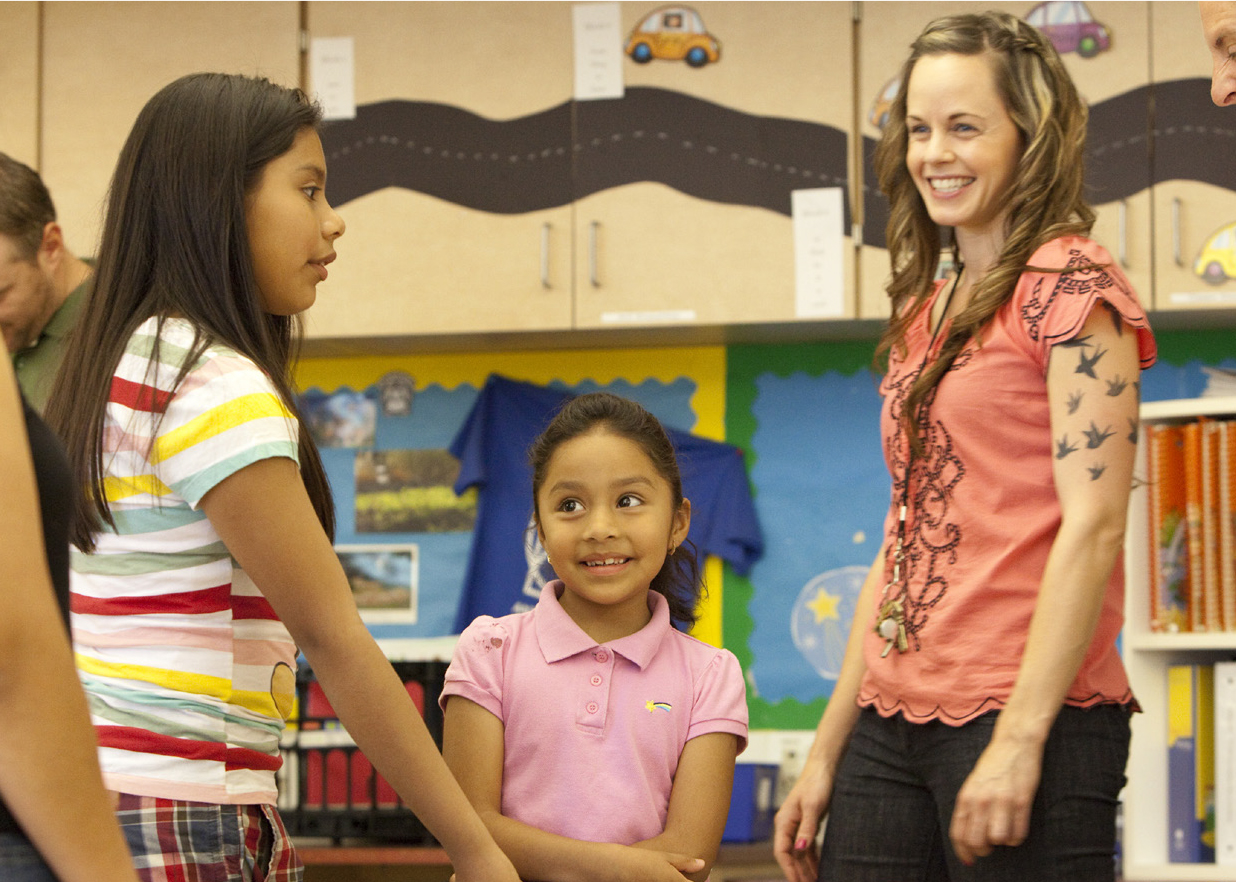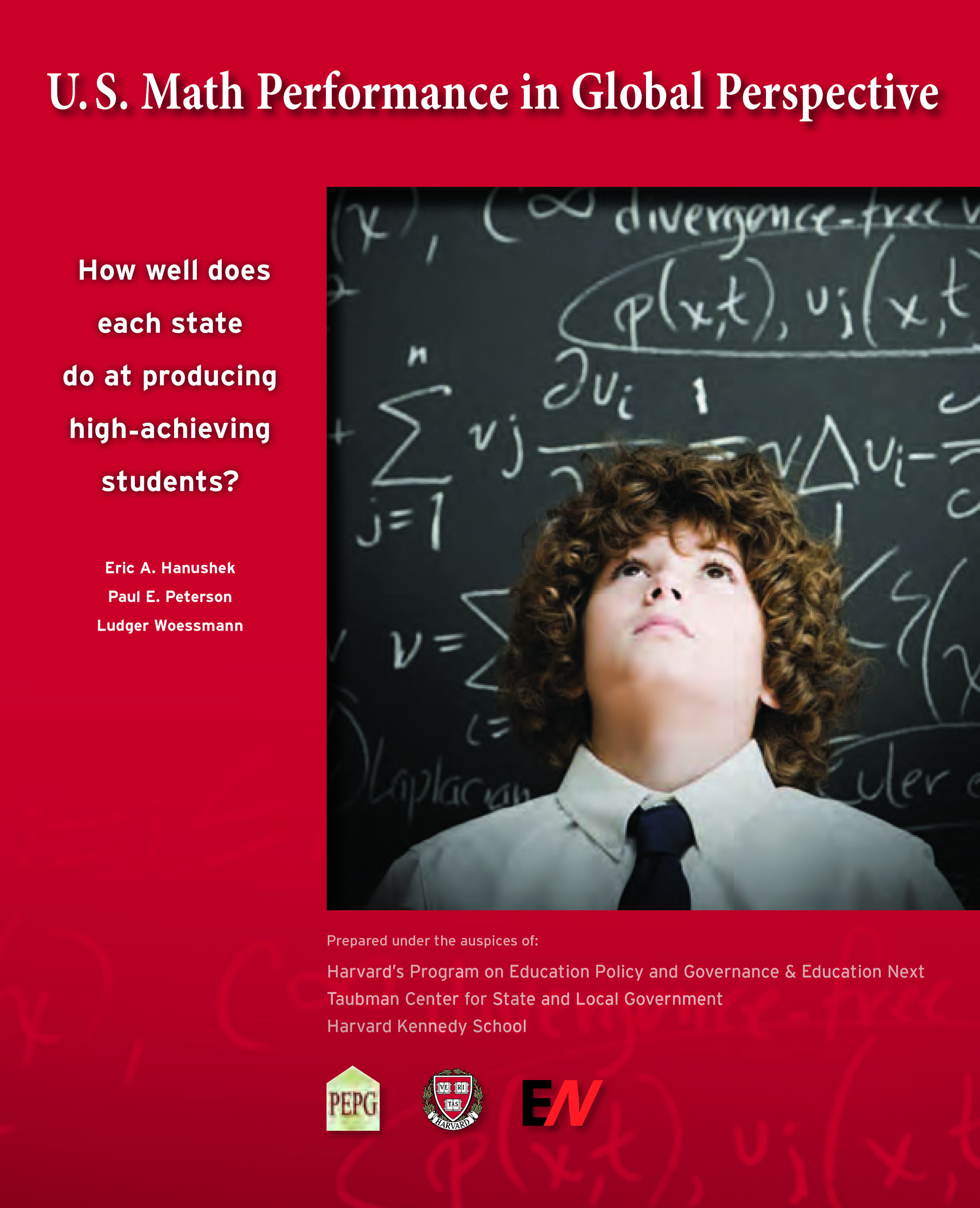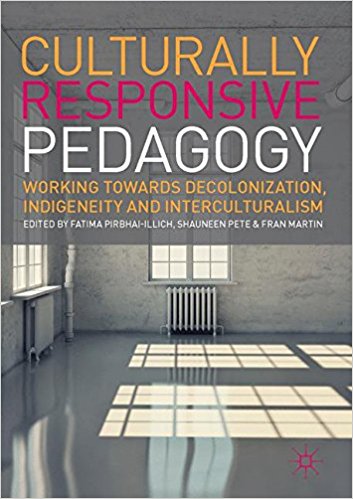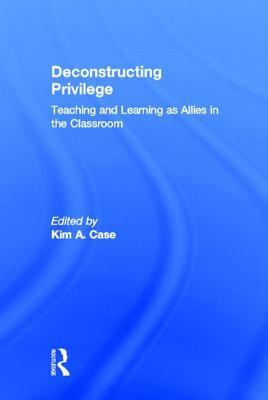General Education, Global Learning, Teaching, and Educational Reform
Articles
Visualize the World: Museum Resources for Global Learning (2012)
~ Global Learning blog article by Anthony Jackson
Media
A Tale of Two Schools (2003)
~ PBS
A Tale of Two Schools is an intimate story about children at risk and the parents and teachers who care about them. Morgan Freeman narrates this compelling one-hour documentary about a dedicated superintendent, a novice teacher, and a first grader overwhelmed by the challenge of learning to read — all captured during a tumultuous year in two struggling schools.
Reports and Publications
The Condition of Education (2014)
~ U.S. Department of Education, National Center for Education Statistics
Globally Challenged: Are U.S. Students Ready to Compete? The latest on each state's international standing in math and reading
~ Paul E. Peterson, Ludger Woessmann, Eric A. Hanushek, Carlos X. Lastra-Anadón | Located on the Harvard Kennedy School Website
Helping to Ensure Equal Access to Education: Report to the President and Secretary of Education
~ U.S. Department of Education and Office of Civil Rights
U.S. Math Performance in Global Perspective: How well does each state do at producing high-achieving students?
~ Eric A. Hanushek, Paul E. Peterson, Ludger Woessmann
Teaching Resources
International Children's Digital Library
An excellent resource for educators and families; this free online library is a place where children can explore literature from around the world.
Veterans History Project
~ Library of Congress
The Veterans History Project of the American Folklife Center collects, preserves, and makes accessible the personal accounts of American war veterans so that future generations may hear directly from veterans and better understand the realities of war.
Wisconsin Biographies
~ Wisconsin Educational Communications Board and University of Wisconsin Extension
Wisconsin Biographies is a social studies and English language arts resource that teaches about Wisconsin history through the use of biographies. Included are animations, leveled books, image galleries, and two online activities. These materials and more are available for free on this site.
Wisconsin Historical Society Press
The mission of the Wisconsin Historical Society Press supports that of the Wisconsin Historical Society. By collecting, preserving, and sharing our stories, we help people connect to the past by publishing the best in Wisconsin history and culture.
Organizations, Agencies, and Associations
The Algebra Project is a national, nonprofit organization that uses mathematics as an organizing tool to ensure quality public school education for every child in America. We believe that every child has a right to a quality education to succeed in this technology-based society and to exercise full citizenship. We achieve this by using best educational research and practices, and building coalitions to create systemic changes.
American Youth Policy Forum
The goal of American Youth Policy Forum is to provide participants with information on public schools, experiences with youth and youth programs out in the field, and networks with other policymakers, researchers, and practitioners that will help them progress and succeed in their work.
Center for American Progress
The Center for American Progress is an independent nonpartisan policy institute that is dedicated to improving the lives of all Americans, through bold, progressive ideas, as well as strong leadership and concerted action. Our aim is not just to change the conversation, but to change the country.
Center for Social Organization of Schools
Thr Center for Social Organization of Schools (CSOS), now part of the Hopkins’ School of Education, concentrates its considerable research and development resources on improving low-performing schools and the education they offer their students. The Center maintains a staff of full-time sociologists, psychologists, social psychologists, and educators who conduct programmatic research to improve the education system, as well as full-time support staff engaged in developing curricula and providing technical assistance to help schools use the center's research.
Charles A. Dana Center | The mission of the Charles A. Dana Center is to enable all students—especially those who are underserved—to achieve postsecondary success.
Council of Chief State School Officers (CCSSO) is a nonpartisan, nationwide, nonprofit organization of public officials who head departments of elementary and secondary education in the states, the District of Columbia, the Department of Defense Education Activity, the Bureau of Indian Education and the five U.S. extra-state jurisdictions.
The Education Trust is a national non-profit advocacy organization that promotes high academic achievement for all students at all levels, particularly for students of color and low-income students. They were founded for one reason and one reason alone: to push, prod, and cajole our country toward educational justice. From their beginnings in the early 1990s, their unrelenting advocacy continues to be supported by solid data analysis, equity-focused legislative proposals, strong partnerships with leading organizations, and proven strategies to improve the educational outcomes of our nation’s youth. With these tools they aim to expose — and eliminate — the gaps in opportunity by race and income that have led to enormous gaps in educational achievement, pre-K through college. These gaps can severely limit economic and social mobility.
National Education Association (NEA), the nation's largest professional employee organization, is committed to advancing the cause of public education. NEA's 3 million members work at every level of education—from pre-school to university graduate programs. NEA has affiliate organizations in every state and in more than 14,000 communities across the United States.
The National Urban Alliance for Effective Education provides professional development, advocacy and organizational guidance that transform urban and suburban schools. They are passionate in striving toward a world in which barriers to high levels of learning borne of racism, sexism and economic disadvantage are eliminated for all children. Their approach is guided by the The Pedagogy of Confidence, the fearless expectation and support for the high intellectual performance of all students, especially those who are dependent on the school and community for the skills and support needed to attain high achievement. We uncover strengths of students and teachers and then build on those strengths.
Wisconsin Department of Public Instruction (DPI) is the state agency that advances public education and libraries in Wisconsin.It is headed by the state superintendent of public instruction, a nonpartisan, constitutional officer elected every four years. State Superintendent Tony Evers, elected in 2009 and again in 2013, is working toward his vision of Every Child a Graduate, College and Career Ready. Evers is the 26th person to hold the office. The agency was created in 1848, the year Wisconsin attained statehood, when the state constitution provided for the establishment of local school districts and a free education for all children in the state.
Wisconsin Statewide Parent-Educator Initiative (WSPEI) is an organization that strives to provide the necessary resources and information in order to keep a positive partnership between parents and school districts. WSPEI assists families and educators to find the resources that will help them build positive working relationships leading to shared decision making and positive outcomes for children’s learning. WSPEI services are free and confidential.
U.S. Department of Education
Their mission is to promote student achievement and preparation for global competitiveness by fostering educational excellence and ensuring equal access.
Recommended Reading
An African Centered Response to Ruby Payne's Poverty Theory (2007)
~ Dr. Kawanza Kunjufu
This challenge to influential educator Ruby Payne's theories about the impact of class differences and economics on teaching and learning puts forward other factors as better predictors of student performance. Pointing to success stories in schools that serve low-income students, this refutation of Payne's popular teacher-training program asserts that teacher expectations, time on task, and the principal's leadership are the main factors in determining educational outcomes at a school. Abandoning Payne's framework of teacher-student income disparities, racial makeup, and per-pupil expenditure, this critical analysis asserts the human component as the most powerful tool for improving education in failing schools.
Building Cultural Reciprocity with Families: Case Studies in Special Education (1999)
~ Beth Harry, Maya Kalyanpur, and Monimalika Day
Eight case studies help to show how using cultural reciprocity to build a framework for relationships can help to strengthen interactions between special education professionals and families. Harry, Kalyanpur, and Day, all special education scholars, examine the culture of special education itself.
Building Equity: Policies and Practices to Empower All Learners (2017)
~ Dominique Smith, Nancy Frey, Ian Pumpian, Douglas Fisher
Imagine a school with a diverse student body where every student feels safe and valued, and all students—regardless of race, culture, home language, sexual orientation, gender identity, academic history, and individual challenges—have the opportunity to succeed with challenging classes, projects, and activities. In this school, teachers notice and meet students' individual instructional needs and foster a harmonious and supportive environment—and students feel empowered to learn, to grow, and to pursue their dreams. This is the school all our students need and deserve. Built on the authors' own experiences and those of hundreds of educators throughout the United States, this book is filled with examples of policy initiatives and practices that support critical standards of equity and high-quality, inclusive learning experiences.
Class Warfare: Inside the Fight to Fix America's Schools (2012)
~ Steven Brill
In a reporting tour de force, award-winning journalist Steven Brill takes an uncompromising look at the adults who are fighting over America’s failure to educate its children—and points the way to reversing that failure.
Brill not only takes the reader inside their roller-coaster battles, he also concludes with a surprising prescription for what it will take from both sides to put the American dream back in America’s schools.
Culturally Proficient Instruction: A Guide for People Who Teach (2011)
~ Kikanza Nuri Robins, Randall B. Lindsey, Delores B. Lindsey, Raymond D. Terrell
Culturally proficient instruction is the result of an inside-out journey during which you explore your values and behaviors while evaluating practices of your workplace. In the newest version of their best-selling book, the authors invite you to reflect on how you engage with your students and your colleagues as a community of learners. The third edition includes: (a) An updated discussion of standards-based education guidelines, (b) A conceptual framework for the tools of cultural proficiency, (c) New language for understanding the microaggressions of dominant cultures, (d) An integrated guide for use with study groups.
The Culturally Proficient School: An Implementation Guide for School Leaders (2013)
~ Randall B. Lindsey, Laraine M. Roberts, and Franklin CampbellJones
This fully updated second edition of The Culturally Proficient School—likely the most influential book yet on improving the learning experience by valuing diversity and cultural dignity— is more relevant, accessible and effective than ever. Incorporating up-to-date research and reader feedback, the new content includes: (a) Instructive vignettes that reflect contemporary truths about educational diversity and moral leadership; (b) Emphasis on skills development, including the art and science of conversation; (c) A conceptual framework that leaves no doubt about the first steps to take towards a more culturally proficient school.
Culturally Responsive Pedagogy: Working towards Decolonization, Indigeneity and Interculturalism (2017)
~ Fatima Pirbhai-Illich, Shauneen Pete, Fran Martin (Editors)
This book convincingly argues that effective culturally responsive pedagogies require teachers to firstly undertake a critical deconstruction of Self in relation to and with the Other; and secondly, to take into account how power affects the socio-political, cultural and historical contexts in which the education relation takes place. The contributing authors are from a range of diaspora, indigenous, and white mainstream communities, and are united in their desire to challenge the hegemony of Eurocentric education and to create new educational spaces that are more socially and environmentally just. In this venture, the ideal education process is seen to be inherently critical and intercultural, where mainstream and marginalized, colonized and colonizer, indigenous and settler communities work together to decolonize selves, teacher-student relationships, pedagogies, the curriculum and the education system itself. This book will be of great interest and relevance to policy-makers and researchers in the field of education; teacher educators; and pre- and in-service teachers.
Culture in Special Education: Building Reciprocal Family-Professional Relationships (1999)
~ Maya Kalyanpur and Beth Harry
With personal anecdotes, case examples, and detailed theoretical discussions, this book brings to light the potential impact of cultural assumptions on parent–professional interactions in special education. Essential reading for future teachers, it helps them become aware of and work to cast aside traditional stereotypes — about other cultures and their own — in order to work effectively with students' families. This textbook also helps educators understand the importance of developing education plans that will enhance children's learning and respect their cultural beliefs. Undergraduate and graduate students of special education will find ways to improve communication with parents and learn to more effectively teach children with diverse cultural heritages.
Deconstructing Privilege: Teaching and Learning as Allies in the Classroom (2013)
~ Kim A. Case (editor)
This edited collection explores best practices for effective teaching and learning about various forms of systemic group privilege such as that based on race, gender, sexuality, religion and class. Although scholarly examinations of privilege have increased in recent decades, an emphasis on privilege studies pedagogy remains lacking within institutions. This edited collection explores best practices for effective teaching and learning about various forms of systemic group privilege such as that based on race, gender, sexuality, religion, and class. Formatted in three easy-to-follow sections, Deconstructing Privilege charts the history of privilege studies and provides intersectional approaches to the topic. Drawing on a wealth of research and real-life accounts, this book gives educators both the theoretical foundations they need to address issues of privilege in the classroom and practical ways to forge new paths for critical dialogues in educational settings. Combining interdisciplinary contributions from leading experts in the field-- such as Tim Wise and Abby Ferber-- with pedagogical strategies and tips for teaching about privilege, Deconstructing Privilege is an essential book for any educator who wants to address what privilege really means in the classroom.
The Essential Conversation: What Parents and Teachers Can Learn from Each Other (2004)
~ Sara Lawrence-Lightfoot
With the insights she has gleaned from her close and subtle observation of parent-teacher conferences, renowned Harvard University professor Sara Lawrence-Lightfoot has written a wise, useful book about the ways in which parents and teachers can make the most of their essential conversation—the dialogue between the most vital people in a child’s life.“The essential conversation” is the crucial exchange that occurs between parents and teachers—a dialogue that takes place more than one hundred million times a year across our country and is both mirror of and metaphor for the larger cultural forces that define family-school relationships and shape the development of our children. Participating in this twice-yearly ritual, so friendly and benign in its apparent goals, parents and teachers are often wracked with anxiety. In a meeting marked by decorum and politeness, they frequently exhibit wariness and assume defensive postures. Even though the conversation appears to be focused on the student, adults may find themselves playing out their own childhood histories, insecurities, and fears. Through vivid portraits and parables, Sara Lawrence-Lightfoot captures the dynamics of this complex, intense relationship from the perspective of both parents and teachers. She also identifies new principles and practices for improving family-school relationships. In a voice that combines the passion of a mother, the skepticism of a social scientist, and the keen understanding of one of our nation’s most admired educators, Lawrence-Lightfoot offers penetrating analysis and an urgent call to arms for all those who want to act in the best interests of their children. For parents and teachers who seek productive dialogues and collaborative alliances in support of the learning and growth of their children, this book will offer valuable insights, incisive lessons, and deft guidance on how to communicate more effectively. In The Essential Conversation, Sara Lawrence-Lightfoot brings scholarship, warmth, and wisdom to an immensely important cultural subject—the way we raise our children.
Evaluating Professional Development, V.1 (2001)
~ Thomas R. Guskey
This is a practical guide to evaluating professional development programs at five increasing levels of sophistication: participants' reaction to professional development; how much participants learned; evaluating organizational support and change; how participants use their new knowledge and skills; and improvements in student learning.
Getting to Got It! Helping Struggling Students Learn How to Learn (2007)
~ Betty K. Garner
In this book, Betty K. Garner focuses on why students struggle and what teachers can do to help them become self-directed learners. Difficulty reading, remembering, paying attention, or following directions are not the reasons students fail but symptoms of the true problem: underdeveloped cognitive structures the mental processes necessary to connect new information with prior knowledge; organize information into patterns and relationships; formulate rules that make information processing automatic, fast, and predictable; and abstract generalizable principles that allow them to transfer and apply learning. Each chapter focuses on a key cognitive structure and uses real-life accounts to illustrate how learners construct meaning by using recognition, memorization, conservation of constancy, classification, spatial orientation, temporal orientation, and metaphorical thinking. The author s simple techniques stress reflective awareness and visualization. It’s by helping students to be conscious of what their senses are telling them, encouraging them to visualize the information for processing, and then prompting them to ask questions and figure out solutions on their own that teachers can best help students develop the tools they need to (a) Gather, organize, and make sense of information; (b) Become cognitively engaged and internally motivated to achieve; and (c) Experience learning as a dynamic process of creating and changing. Suggestions for using these techniques in daily classroom practice, advice on lesson planning for cognitive engagement, and guidelines for conducting reflective research expand this book s practical applications. Use it not only to help struggling students break through hidden barriers but to empower all students with tools that will last a lifetime.
Identity Safe Classrooms: Places to Belong and Learn (2013)
~ Dorothy M. Steele and Esther Rebecca (Becki) Cohn-Vargas
This book focuses on strategies that positively affect student learning and attachment to schooling, in spite of social inequalities. Research shows that students in identity safe classrooms learn better and like school more than peers in other classrooms. In identity safe classrooms, teachers strive to ensure that students: (a) Feel their identity is an asset rather than a barrier to success; (b) Experience diversity as a resource for learning; (c) Form positive relationships with fellow students and their teacher; (d) Learn in an environment with a challenging curriculum and high expectations; and (e) Develop a sense of belonging and empathy for others as they learn to use pro-social skills and practice cooperation.
It's Being Done: Academic Success in Unexpected Schools (2007)
~ Karin Chenoweth
This straightforward and inspiring book takes readers into schools where educators believe—and prove—that all children, even those considered “hard-to-teach,” can learn to high standards. Their teachers and principals refuse to write them off and instead show how thoughtful instruction, high expectations, stubborn commitment, and careful consideration of each child’s needs can result in remarkable improvements in student achievement.
The Light in Their Eyes: Creating Multicultural Learning Communities (2009)
~ Sonia Nieto
Sonia Nieto reviews where we have been and where we should be going in our pursuit of creating multicultural learning communities in our schools. With a new Introductory Chapter and a new Epilogue, Nieto addresses some of the changes we have experienced during the past decade that help explain the current sociopolitical environment, our increasing diversity, the altering conditions in schools and in society, the influence of poverty on learning, and the impact of NCLB on classrooms and schools. This updated edition of The Light in Their Eyes focuses on the significant role of teachers in transforming students' lives. It considers recent theories, policies, and practices about the variability in student learning and culturally responsive pedagogy and examines the importance of student and teacher voice in research and practice. It also provides an update, in their own words, on former students whose journal entries were included in the first edition.
Minority Students in Special and Gifted Education (2002)
~ Committee on Minority Representation in Special Education, National Research Council, Division of Behavioral and Social Sciences and Education, Cognitive, and Sensory Sciences Board on Behavioral, Christoper T. Cross (Editor), M. Suzanne Donovan (Editor)
Special education and gifted and talented programs were designed for children whose educational needs are not well met in regular classrooms. From their inceptions, these programs have had disproportionate representation of racial and ethnic minority students. What causes this disproportion? Is it a problem? Minority Students in Special and Gifted Education considers possible contributors to that disparity, including early biological and environmental influences and inequities in opportunities for preschool and K-12 education, as well as the possibilities of bias in the referral and assessment system that leads to placement in special programs. It examines the data on early childhood experience, on differences in educational opportunity, and on referral and placement. The book also considers whether disproportionate representation should be considered a problem. Do special education programs provide valuable educational services, or do they set students off on a path of lower educational expectations? Would students not now placed in gifted and talented programs benefit from raised expectations, more rigorous classes, and the gifted label, or would they suffer failure in classes for which they are unprepared? By examining this important problem in U.S. education and making recommendations for early intervention and general education, as well as for changes in referral and assessment processes, Minority Students in Special and Gifted Education will be an indispensable resource to educators throughout the nation, as well as to policy makers at all levels, from schools and school districts to the state and federal governments.
Other People's Children: Cultural Conflict in the Classroom (2006)
~ Lisa Delpit
Winner of an American Educational Studies Association Critics’ Choice Award and Choice Magazine’s Outstanding Academic Book Award, and voted one of Teacher Magazine’s “great books,” Other People’s Children has sold over 150,000 copies since its original hardcover publication. This anniversary paperback edition features a new introduction by Delpit as well as new framing essays by Herbert Kohl and Charles Payne. In a radical analysis of contemporary classrooms, MacArthur Award–winning author Lisa Delpit develops ideas about ways teachers can be better “cultural transmitters” in the classroom, where prejudice, stereotypes, and cultural assumptions breed ineffective education. Delpit suggests that many academic problems attributed to children of color are actually the result of miscommunication, as primarily white teachers and “other people’s children” struggle with the imbalance of power and the dynamics plaguing our system. A new classic among educators, Other People’s Children is a must-read for teachers, administrators, and parents striving to improve the quality of America’s education system.
Pedagogy of the Oppressed (2000)
~ Paulo Freire, Myra Bergman Ramos (Translator), Donaldo Macedo (Introduction), Richard Shaull (Foreword)
First published in Portuguese in 1968, Pedagogy of the Oppressed was translated and published in English in 1970. The methodology of the late Paulo Freire has helped to empower countless impoverished and illiterate people throughout the world. Freire's work has taken on especial urgency in the United States and Western Europe, where the creation of a permanent underclass among the underprivileged and minorities in cities and urban centers is increasingly accepted as the norm. This text argues that the ignorance and lethargy of the poor are the direct result of the whole economic, social and political domination. The book suggests that in some countries the oppressors use the system to maintain a "culture of silence". Through the right kind of education, the book suggests, avoiding authoritarian teacher-pupil models and based on the actual experiences of students and on continual shared investigation, every human being, no matter how impoverished or illiterate, can develop a new awareness of self, and the right to be heard.With a substantive new introduction on Freire's life and the remarkable impact of this book by writer and Freire confidant and authority Donaldo Macedo, this anniversary edition of Pedagogy of the Oppressed will inspire a new generation of educators, students, and general readers for years to come.
Privilege, Power and Difference (2005)
~ Allan G. Johnson
This brief book is a groundbreaking tool for students and non-students alike to examine systems of privilege and difference in our society. Written in an accessible, conversational style, Johnson links theory with engaging examples in ways that enable readers to see the underlying nature and consequences of privilege and their connection to it. This extraordinarily successful book has been used across the country, both inside and outside the classroom, to shed light on issues of power and privilege.
Raising Cain: Protecting the Emotional Life of Boys (2000)
~ Dan Kindlon, Ph.D. and Michael Thompson, Ph.D.
In Raising Cain, Dan Kindlon, Ph.D., and Michael Thompson, Ph.D., two of the country's leading child psychologists, share what they have learned in more than thirty-five years of combined experience working with boys and their families. They reveal a nation of boys who are hurting--sad, afraid, angry, and silent. Kindlon and Thompson set out to answer this basic, crucial question: What do boys need that they're not getting? They illuminate the forces that threaten our boys, teaching them to believe that "cool" equals macho strength and stoicism. Cutting through outdated theories of "mother blame," "boy biology," and "testosterone," the authors shed light on the destructive emotional training our boys receive--the emotional miseducation of boys.
Reading, Writing, and Rising Up: Teaching About Social Justice and the Power of the Written Word (2000)
~ Linda Christensen
A practical, inspirational book offering essays, lesson plans, and a remarkable collection of student writing, all rooted in an unwavering focus on language arts teaching for justice. An excellent resource for colleagues, staff development, teacher education, and school libraries.
Readings for Diversity and Social Justice: An Anthology on Racism, Antisemitism, Sexism, Heterosexism, Ableism, and Classism (1st ed., 2000)
~ Maurianne Adams, Warren J. Blumenfeld, Carmelita (Rosie) Castañeda, Heather W. Hackman, Madeline L. Peters, Ximena Zúñiga (Editors)
The first reader to cover the scope of oppressions in America, Readings for Diversity and Social Justice covers six thematic issues: racism, sexism, Anti-Semitism, heterosexism, classism, and ableism. The reader contains a mix of short personal and theoretical essays as well as entries designed to challenge students to take action to end oppressive behavior and to affirm diversity and racial justice.
Readings for Diversity and Social Justice: An Anthology on Racism, Antisemitism, Sexism, Heterosexism, Ableism, and Classism (3rd ed., 2013)
~ Maurianne Adams, Warren J. Blumenfeld, Heather W. Hackman, Madeline L. Peters, Ximena Zúñiga (Editors)
For more than a decade, Readings for Diversity and Social Justice has been the trusted, leading anthology to cover the full range of social oppressions from a social justice standpoint. With full sections dedicated to racism, sexism, classism, heterosexism, and ableism, as well as transgender oppression, religious oppression, and adult and ageism, this bestselling text goes far beyond the range of traditional readers. New essay selections in each section of this third edition have been carefully chosen to keep topic coverage timely and readings accessible and engaging for students. The interactions among these topics are highlighted throughout to stress the interconnections among oppressions in everyday life. Retaining the key features and organization that has made Readings for Diversity and Social Justice an indispensable text for teaching issues of social justice while simultaneously updating and expanding its coverage, this new edition features: (a) Over 20 new selections considering current topics and events such as immigration trends, racial profiling, student debt, Occupy Wall Street and global GLBT rights. (b) An updated companion website with additional resources, including video clips that further complement the readings in each section. Strong and accessible section introductions to highlight key points and relate the essential concepts of any given topic to other forms of oppression. (c) An explicit emphasis on the interconnectedness of social identity and social inequality throughout, with a second table of contents that notes the intersections among readings. Offering over one-hundred and thirty selections from some of the foremost scholars in a wide range of fields, Readings for Diversity and Social Justice is the indispensable volume for every student, teacher, and social justice
Rural Ethnic Minority Youth and Families in the United States: Theory, Research, and Applications (2016)
~ Lisa J. Crockett (Editor), Gustavo Carlo (Editor)
This book explores the risk and protective factors of rural life and minority status for youth and their families. It provides innovative perspectives on well-documented developmental challenges (e.g., poverty and lack of resources) as well as insights into the benefits of familial and cultural strengths. Coverage includes recent theories in child development, empirical studies of rural minority populations, and leading-edge interventions for urgent issues. The volume presents a spectrum of opportunities for understanding and providing services for youth in the United States through the lens of a diverse collection of ethnic minority experiences in rural settings.
Rural Ethnic Minority Youth and Families in the United States is a valuable resource for researchers and professors, clinicians and related professionals and graduate students across such disciplines as clinical child, school and developmental psychology, family studies, social work and public health.
Start Where You Are, But Don’t Stay There: Understanding Diversity, Opportunity Gaps, and Teaching in Today’s Classrooms (2010)
~ H. Richard Milner IV (Author), Gloria Ladson-Billings (Foreword)
Start Where You Are, But Don’t Stay There addresses a crucial issue in teacher training and professional education: the need to prepare pre-service and in-service teachers for the racially diverse student populations in their classrooms. A down-to-earth book, it aims to help practitioners develop insights and skills for successfully educating diverse student bodies. The book centers on case studies that exemplify the challenges, pitfalls, and opportunities facing teachers in diverse classrooms. These case studies―of white and African American teachers working (and preparing to work) in urban and suburban settings―are presented amid more general discussions about race and teaching in contemporary schools. Informing these discussions and the cases themselves is their persistent attention to opportunity gaps that need to be fully grasped by teachers who aim to understand and promote the success of students of greatly varying backgrounds. Start Where You Are, But Don’t Stay There arises out of recent scholarship about race and education, but it is more directly inspired by the pressing need for useful and credible guidance for professional educators in diverse classrooms. It will prove indispensable to teachers, administrators, and scholars alike.
Trust in Schools: A Core Resource for Improvement (2004)
~ Anthony S. Bryk, and Barbara Schneider
Most Americans agree on the necessity of education reform, but there is little consensus about how this goal might be achieved. The rhetoric of standards and vouchers has occupied center stage, polarizing public opinion and affording little room for reflection on the intangible conditions that make for good schools. Trust in Schools engages this debate with a compelling examination of the importance of social relationships in the successful implementation of school reform. Over the course of three years, Bryk and Schneider, together with a diverse team of other researchers and school practitioners, studied reform in twelve Chicago elementary schools. Each school was undergoing extensive reorganization in response to the Chicago School Reform Act of 1988, which called for greater involvement of parents and local community leaders in their neighborhood schools. Drawing on years longitudinal survey and achievement data, as well as in-depth interviews with principals, teachers, parents, and local community leaders, the authors develop a thorough account of how effective social relationships—which they term relational trust—can serve as a prime resource for school improvement. Using case studies of the network of relationships that make up the school community, Bryk and Schneider examine how the myriad social exchanges that make up daily life in a school community generate, or fail to generate, a successful educational environment. The personal dynamics among teachers, students, and their parents, for example, influence whether students regularly attend school and sustain their efforts in the difficult task of learning. In schools characterized by high relational trust, educators were more likely to experiment with new practices and work together with parents to advance improvements. As a result, these schools were also more likely to demonstrate marked gains in student learning. In contrast, schools with weak trust relations saw virtually no improvement in their reading or mathematics scores. Trust in Schools demonstrates convincingly that the quality of social relationships operating in and around schools is central to their functioning, and strongly predicts positive student outcomes. This book offer insights into how trust can be built and sustained in school communities, and identifies some features of public school systems that can impede such development. Bryk and Schneider show how a broad base of trust across a school community can provide a critical resource as education professional and parents embark on major school reforms.
Why Are So Many Minority Students in Special Education?: Understanding Race & Disability in Schools (2014)
~ Beth Harry and Janette Klingner
The second edition of this powerful book examines the disproportionate placement of Black and Hispanic students in special education. The authors present compelling, research-based stories representing the range of experiences faced by culturally and linguistically diverse students who fall in the liminal shadow of perceived disability. They examine the children's experiences, their families' interactions with school personnel, the teachers' and schools' estimation of the children and their families, and the school climate that influences decisions about referrals to special education. Based on the authors' 4 years of ethnographic research in a large, culturally diverse school district, the book concludes with recommendations for improving educational practice, teacher training, and policy renewal.
Why We Teach (2005)
~ Sonia Nieto
These teachers listen closely to their students. They share in their students' struggles and successes. They create a classroom climate that encourages growth, direction, and purpose. They help students develop into thoughtful, engaged citizens. The teachers in this book show us the kinds of learning that really matter, and the kinds of lessons that students can take with them for their entire lives.













































